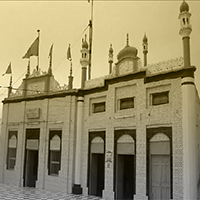Profile of Qadir Bakhsh Bedil
Faqir Qadir Bakhsh Bedil is one of the leading Sufi Seraiki poets of Pakistan. His father's name was Muhammad Mohsin. He was also a Sufi and Darvesh man. Because his father had a great love and affection for Sheikh Abdul Qadir Jilani, he was named Abdul Qadir in his adoration, but Bedil preferred to call himself Qadir Bakhsh respectfully and adopted Bedil as his oen name. Born in 1815 in Rohri area of Sindh state. He was admitted to the school for elementary education but could not read beyond the letter A. No details are available as to from whom he studied the Qur'an, jurisprudence, hadith, mathematics and logic. There is a long list of his writings which gives a good indication that he studied Arabic, Persian, Urdu, Sufism and medicine. He also traveled to a few places. He had deep devotion to Shahbaz Qalandar, and visited him and stayed at his shrine at Sehwan Sharif for a long time. In this connection, he reached his native village Pir Pagara in the service of Sibghatullah Shah-I and taught his son Gauhar Ali Shah exclusively the "Masnavi Ma'navi" of Maulana Jalaluddin Rumi which resulted in Pir Ali Gauhar Shah. There was a great Sufi poet of Sindhi language who was nicknamed Asghar. Similarly, he visited the shrines of Shah Abdullatif Bhitai, Sachal Sarmast and Makhdoom Muhammad Ismail and learned the manners and methods from contemporary saints and shaykhs. He died in 1873. His son Muhammad Mohsin Bekas is a well-known Seraiki poet. A large number of Hindus and Muslims attended his funeral and he was buried near Rohri station. In Sufism, he was a proponent of Wahdat-ul-Wujood. He was popular with both Shias and Sunnis. He has recited poems in honor of Hazrat Ali and Imams. Although Bedil visited many Sufi shrines and shrines, he also continued to compose. He is also a prolific writer in both prose and poetry. There is a long list of his writings. Four Divans of his are available in Urdu, Persian, Sindhi, and Arabic and his works are available in each language.

